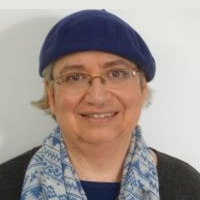Karen Schochet
Credentials
Finances
Licensed in Israel
- Emek Hahula 93/9
- Modiin, 7173234
Karen Schochet
 Verified
Verified
Credentials
Clinical Psychologist
PsyD
Finances
350-500 NIS
N/A
Special Rate for New Olim | Sliding Scale | Free Consultation | Student Discount
ABOUT THE THERAPIST
I help my clients to understand and heal themselves so that they can develop both personally and interpersonally, in their ability to work and to love, to play, to create and to enjoy solitude.
My first goal in our work together is to provide a safe space for you to express your feelings, get to know yourself better, and tell your story. Over time you can decide how deeply you want to go. I am open to anything you would like to talk about in any form in which you would like to express yourself.
“Since there are feelings (& thoughts) I can’t express through the forms of society, here I make other forms, play-forms, to express them through:” (A.R. Ammons) Younger adolescents will usually play as well as talk in therapy. While adults and older adolescents generally come to therapy to talk, they may express themselves artistically if they wish. They are welcome to discuss particular issues, but they can also “play” in their talk, sharing their areas of interest, their dreams and daydreams, jokes, anecdotes, bits of remembered conversation, fragments of a favorite novel or nearly forgotten film. Together we piece these fragments into a coherent whole and we may discover together things you never knew about yourself.
Building and consolidating identity including gender identity, religious identity, professional identity
Navigating life transitions including aliyah, marriage, parenthood, beginning a career, divorce, grief
Recovering from past trauma
Anxiety and phobias
Supporting family members with special needs
Building and maintaining relationships with family, friends co-workers and romantic partners. I work on relationships with couples as well as with individuals
My major role as a therapist is to provide a safe space for you to express a variety of emotions, including sadness, anger, fear, and joy, and to help you understand yourself better.
For many clients my role will also include providing you with the opportunity to discover who you are and tell your life story. We all need to tell our life story and people who have been traumatized in the past are especially in need of someone who can hear things they have never told anyone and validate their feelings.
My role may also include teaching skills such as mindfulness, relaxation, controlling impulsivity, time management, and interpersonal communication.
I see adolescents from age twelve and adults face to face in my Modiin clinic. I am open to working remotely but only with individuals who live in Israel. I work both in English, my native tongue, and Hebrew which I speak fluently from childhood.
If you are seriously committed to therapy and cannot afford my full fee, I am open to negotiating a fee appropriate for both of us.
QUALIFICATIONS
PsyD
Ferkauf Graduate School
1985
Degree
PsyDEducation
Ferkauf Graduate SchoolYear of Graduation
1985Years in Practice
39
REGISTERED PSYCHOLOGIST IN ISRAEL
Registration in Pinkas Hapsichologim
3288
Mumche Category
Clinical Psychologist
Mumche License Number
002646
ADDITIONAL CREDENTIALS
Post Graduate Certificate in Psychotherapy from the Center for Psychoanalytically Oriented Psychotherapy Studies ("Halfaba"), Tel Aviv
Supervising Clinical Psychologist in Israel in Psychotherapy and Psychodiagnostics
Madrich Tipul License : 5434
Madrich Ivchun License : 5735
Emotionally Focused Couples Therapy - Osnat Cohen Ganor, Clinical Psychologist - 2022
DISTANCE COUNSELING
Telephone Counseling, Online Therapy
PRIMARY SPECIALTIES
Anxiety / Panic
Family Issues
Grief
LGBTQ
Life Transitions
ADDITIONAL SPECIALTIES
Adjustments
Autism Spectrum
Cancer / Terminal Illness
Couples / Relationship / Marriage Counseling
Depression
Dissociative Disorders
Parenting Issues / Training
Personality Disorders
Self-Esteem
Sexual Abuse / Rape
Stress Management
Trauma / Post Traumatic Stress Disorder PTSD
CLIENT FOCUS
Population
Adolescents
Adults
Couples
Men
Women
LGBTQ
Languages Spoken
Hebrew
English
TREATMENT APPROACH
Cognitive Behavioral Therapy (CBT)Cognitive Behavioral Therapy (CBT) is a type of psychotherapy that focuses on how one's thoughts, feelings and behaviors are connected and can be changed. It is based on the idea that how we think (cognition) and how we feel (emotion) can influence how we behave. CBT helps people identify and challenge distorted thinking and replace it with more balanced thinking, leading to improved mood and behavior. ‘Homework’, usually containing practical writing exercises, is often completed by the client between sessions to reinforce the therapy. Examples of tools that practitioners often use are journaling, challenging beliefs, and mindfulness.
Emotion-Focused TherapyEmotion-focused therapy (EFT) is a type of psychotherapy that is based on the idea that emotions play a key role in a person’s mental health. EFT focuses on helping people to identify, accept, and manage their emotions in a healthy and productive way. The goal of EFT is to help people identify and express their emotions, understand how those emotions impact their behavior, and learn how to manage their emotions in a way that is adaptive and healthy. EFT is a research-based approach to psychotherapy that has been found to be effective in helping people manage a variety of mental health conditions. It has been used successfully in the treatment of individuals, couples, and families, as well as with groups. EFT is particularly beneficial for people who struggle with emotional regulation, mood disorders, anxiety, trauma, and relationship issues.
Psychodynamic TherapyPsychodynamic therapy is a form of therapy that focuses on the unconscious mind and how it affects behavior. It works to help people understand and work through past experiences and feelings that may be causing difficulties in the present. This type of therapy encourages individuals to explore their emotions, relationships, and behaviors in order to gain insight into their current difficulties. It can help individuals better understand themselves and their motivations, and gain insight into how past events have impacted their current lives. People tend to develop defense mechanisms when faced with challenges in life. Defense mechanisms may keep painful feelings, memories, and experiences in the unconscious. A few common defense mechanisms include: denial, repression, and rationalization. Psychodynamic therapists encourage people to speak freely about their emotions, desires, and fears. Being open may help uncover vulnerable feelings that have been pushed out of conscious awareness. According to psychodynamic theory, behavior is influenced by unconscious thought. Once painful feelings are brought forth and processed, the defense mechanisms are no longer needed and a person in treatment can start changing unhelpful patterns when coping with life’s challenges.
Relational PsychotherapyRelational psychotherapy is a form of psychotherapy that focuses on a person’s relationships with others and the dynamics between them. It emphasizes the importance of the therapeutic relationship between the client and the therapist, and it explores the meaning and purpose of relationships in the client’s life. Relational psychotherapy seeks to understand how the client’s past relationships shape their current experiences and how the client interacts with others. The goal is to help the person develop healthier relationships and better communication skills so they can become more emotionally connected to others.
Emotion-Focused-Therapy for Couples
SERVICES OFFERED
Individual Therapy
Couples Therapy
Clinical Supervision
Hadrachat Horim


 Verified
Verified

